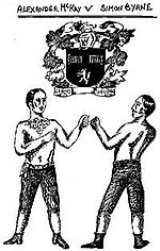
Simon Byrne
Encyclopedia
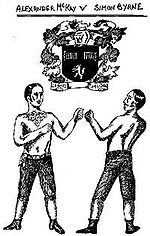
Bare-knuckle boxing
Bare-knuckle boxing is the original form of boxing, closely related to ancient combat sports...
prize fighter. The heavyweight
Heavyweight
Heavyweight is a division, or weight class, in boxing. Fighters who weigh over 200 pounds are considered heavyweights by the major professional boxing organizations: the International Boxing Federation, the World Boxing Association, the World Boxing Council, and the World Boxing...
boxing
Boxing
Boxing, also called pugilism, is a combat sport in which two people fight each other using their fists. Boxing is supervised by a referee over a series of between one to three minute intervals called rounds...
champion of Ireland, he was drawn to England by the larger sums of prize money on offer and his hopes of becoming the heavyweight champion there as well. He became one of only six fighters ever to have been involved in fatal fights as both survivor and deceased since records began in 1741.
Byrne fought in an era when English boxing, although illegal, was patronised by many powerful individuals. Its patronage and popularity did not, however, free it from corruption
Corporate crime
In criminology, corporate crime refers to crimes committed either by a corporation , or by individuals acting on behalf of a corporation or other business entity...
, heavy betting
Sports betting
Sports betting is the activity of predicting sports results and placing a wager on the outcome.-United States of America:Aside from simple wagers such as betting a friend that one's favorite baseball team will win its division or buying a football "square" for the Super Bowl, sports betting is...
, and staged fights
Match fixing
In organised sports, match fixing, game fixing, race fixing, or sports fixing occurs as a match is played to a completely or partially pre-determined result, violating the rules of the game and often the law. Where the sporting competition in question is a race then the incident is referred to as...
. Byrne fought eight recorded matches, but accounts of his career focus on the last three, against the Scottish champion Alexander McKay, the English champion Jem Ward
Jem Ward
Jem Ward was an English bare-knuckle boxer. "A fine fighter and powerfully built man", he was the English champion boxer from 1825 until 1831. However, he is most notable for being the first boxer to be officially disciplined for deliberately losing a fight. During his fighting career he was...
, and James Burke
James Burke (boxer)
James "Deaf" Burke , 6 feet 2 inches tall, weighing 200 lb , was one of England's earliest boxing champions. He trained in the area around the River Thames....
for the vacant championship of England. The injuries McKay received in his fight with Byrne resulted in his death the following day, and rioting in his home country of Scotland. Byrne went on to lose his next match against Jem Ward, which some commentators believed he was not sufficiently in condition to fight. His final contest in May 1833 was a gruelling 99 rounds against James Burke
James Burke (boxer)
James "Deaf" Burke , 6 feet 2 inches tall, weighing 200 lb , was one of England's earliest boxing champions. He trained in the area around the River Thames....
that lasted for 3 hours and 6 minutes, the longest ever recorded prize fight. Byrne died three days later as the result of damage to his brain caused by the beating he had received
Burke was arrested and tried for manslaughter but was acquitted. Following the death in 1838 of another fighter, William Phelps, also known as Brighton Bill, the London Prize Ring Rules were introduced to more clearly define the rules of prize fighting and to introduce certain safety measures, rules that still form the basis for the modern sport of boxing.
Early 19th-century English boxing
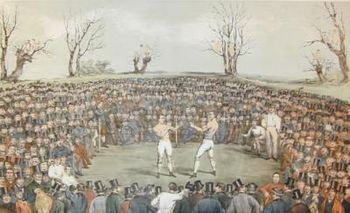
Riot Act
The Riot Act was an Act of the Parliament of Great Britain that authorised local authorities to declare any group of twelve or more people to be unlawfully assembled, and thus have to disperse or face punitive action...
of 1715, which defined a riot as "a tumultuous disturbance of the peace by three or more persons assembling together, of their own authority, with intent mutually to execute a violent enterprise to the terror of the people".
The boxer George Stevenson had died a few days after his 35-minute fight with the English champion Jack Broughton
Jack Broughton
John "Jack" Broughton was an English bare-knuckle fighter. He was the first person to ever codify a set of rules to be used in such contests; prior to this the "rules" that existed were very loosely defined and tended to vary from contest to contest...
in 1741, an event that triggered Broughton to draw up a set of rules with the help of some of his patrons to prevent a recurrence. Published on 16 August 1743, Broughton's Rules outlawed hitting or seizing any part of an opponent's body below the waist, or striking him when he was down, but otherwise left much to the discretion of referees. Rounds were not of a fixed length but continued until one of the fighters was knocked or thrown to the ground, after which those in his corner were allowed 30 seconds to return him to the "scratch" – the middle of the ring – failing which his opponent was declared the victor.
The sport enjoyed an unprecedented surge in popularity during the Regency period when it was openly patronised by the Prince Regent
Prince Regent
A prince regent is a prince who rules a monarchy as regent instead of a monarch, e.g., due to the Sovereign's incapacity or absence ....
(later George IV) and his brothers. Championship boxing matches acquired a louche reputation as the places to be seen by the wealthy upper class
Upper class
In social science, the "upper class" is the group of people at the top of a social hierarchy. Members of an upper class may have great power over the allocation of resources and governmental policy in their area.- Historical meaning :...
es. Thus a match would often be attended by thousands of people, many of whom had wagered money on the outcome. The Duke of Cumberland
Prince William Augustus, Duke of Cumberland
Prince William , was a younger son of George II of Great Britain and Caroline of Ansbach, and Duke of Cumberland from 1726. He is generally best remembered for his role in putting down the Jacobite Rising at the Battle of Culloden in 1746, and as such is also known as "Butcher" Cumberland...
(an uncle of King George III
George III of the United Kingdom
George III was King of Great Britain and King of Ireland from 25 October 1760 until the union of these two countries on 1 January 1801, after which he was King of the United Kingdom of Great Britain and Ireland until his death...
) was reported to have bet thousands of pounds on Jack Broughton, who was the English champion for 18 years.
Boxing had become a nest of "gambling related corruption" by the 1820s. The epitome of this era was the championship reign of Jem Ward
Jem Ward
Jem Ward was an English bare-knuckle boxer. "A fine fighter and powerfully built man", he was the English champion boxer from 1825 until 1831. However, he is most notable for being the first boxer to be officially disciplined for deliberately losing a fight. During his fighting career he was...
, a fighter who on one occasion admitted taking £100, equivalent to several thousand pounds today, to lose a contest. By 1830 the sport had become widely known for its corruption, and blatant cheating was commonplace. It was against this background that Simon Byrne earned his living.
Early life
Very little is known of Byrne's early life beyond the fact that he was born in Ireland in 1806. His first fight, in 1825, was a loss to Mike Larking; it lasted 138 rounds spread over two and a half hours—despite the fact that at this time a round could vary in length, and usually only ended when a man was knocked down. His second fight was a draw against Jack Manning in 1826, earning Byrne £100. Next was Byrne's first match against the Scottish boxer Alexander McKay, which Byrne won easily in five rounds, earning him a further £100. This match was McKay's first ever prize-fight. This victory was soon followed by a win against Bob Avery, earning a further £50, then another win over Phil Samson in 1829, earning him £200. By the standards of the day these latter sums were enormous; it is therefore surprising that he was then offered £200 for a rematch, regardless of whether he won or not, against the less experienced McKay, whom he had beaten so easily on the first occasion. As of 2008 that would be the equivalent of about £13,600.Byrne versus McKay

Tom Spring
Tom Spring was an English bare-knuckle fighter. He was heavyweight champion of England in 1821 until his retirement in 1824...
's "Castle Tavern", in Holborn
Holborn
Holborn is an area of Central London. Holborn is also the name of the area's principal east-west street, running as High Holborn from St Giles's High Street to Gray's Inn Road and then on to Holborn Viaduct...
. The former champion boxer Tom Spring, as treasurer of the "Fair Play Club" – the organization which oversaw boxing – was immensely influential in the boxing world. Along with two other well-known boxers, Gentleman Jackson
John Jackson (boxer)
"Gentleman" John Jackson was a celebrated pugilist of the late 18th century.He won the title Champion of England in a fight on 15 April 1795 in which he beat...
and Tom Cribb
Tom Cribb
Tom Cribb was an English bare-knuckle boxer of the 19th century, so successful that he became world champion. He is a member of the International Boxing Hall of Fame.-Life:...
(who also acted as Byrne's manager), he was Byrne's sponsor for the match. Cribb was considered to be one of the greatest fighters of the era; more than 20,000 people attended one of his fights.
Contracts were signed at Spring's tavern and it was arranged for the fight to take place at Hanslope
Hanslope
Hanslope is a village in the Borough of Milton Keynes and is the centre of a Civil Parish of the same name. It is about 4 miles WNW of Newport Pagnell, about 4 miles north of Stony Stratford, about 8 miles north of Central Milton Keynes and just south of Northamptonshire. For ceremonial...
, Buckinghamshire
Buckinghamshire
Buckinghamshire is a ceremonial and non-metropolitan home county in South East England. The county town is Aylesbury, the largest town in the ceremonial county is Milton Keynes and largest town in the non-metropolitan county is High Wycombe....
. But as a vast crowd of spectators began pouring into Hanslope the venue was switched at the last minute to Salcey Green
Salcey Green
Salcey Green is an area of farm and wood land, today, within the parish of Hanslope in the Borough of Milton Keynes, England. In 1830 it was the scene of an infamous bare-knuckle fight between the boxers Simon Byrne and Alexander McKay which resulted in McKay's death.- References and external...
, just inside Northamptonshire
Northamptonshire
Northamptonshire is a landlocked county in the English East Midlands, with a population of 629,676 as at the 2001 census. It has boundaries with the ceremonial counties of Warwickshire to the west, Leicestershire and Rutland to the north, Cambridgeshire to the east, Bedfordshire to the south-east,...
, thus rendering the Buckinghamshire constables powerless to prevent it.
Despite the publicity and billing this was only McKay's fifth prize-fight. Since his defeat at the hands of Byrne two-and-half years earlier McKay had fought and won just three matches, earning him £180, while Byrne had earned £200. Both men were promised £200 for the match whatever its outcome. McKay had earned £100 for his previous fight against Paul Spencer, the most he had ever received; the promised payment was a huge improvement in his fortunes.
McKay's boxing relied on brute strength rather than scientific pugilistic theory, but the fight still lasted for 47 rounds before McKay collapsed under a left-handed punch to the throat that did not seem particularly powerful. He was carried to his corner where he regained consciousness, complaining of severe headache. He was bled by a surgeon
Surgeon
In medicine, a surgeon is a specialist in surgery. Surgery is a broad category of invasive medical treatment that involves the cutting of a body, whether human or animal, for a specific reason such as the removal of diseased tissue or to repair a tear or breakage...
on the scene and taken to a local inn, the Watts Arms, where he died at 9:00 pm the following evening. A post mortem examination found the cause of death to be brain damage. McKay was buried in Hanslope Churchyard with the following inscription on his headstone:
McKay's death attracted widespread publicity and led to rioting in the streets of his homeland. In Dundee, three people died and 200 were injured in the fracas. In Glasgow
Glasgow
Glasgow is the largest city in Scotland and third most populous in the United Kingdom. The city is situated on the River Clyde in the country's west central lowlands...
, four people died, and the Dragoons were called out to quell rioting after a Roman Catholic
Roman Catholic Church
The Catholic Church, also known as the Roman Catholic Church, is the world's largest Christian church, with over a billion members. Led by the Pope, it defines its mission as spreading the gospel of Jesus Christ, administering the sacraments and exercising charity...
church was burned and looted (the mob would have assumed Byrne, an Irishman, to be a Roman Catholic). Byrne was arrested three days later on board the ferry to Ireland as he tried to leave the country. He was incarcerated in Buckingham Gaol to await his trial and the prospect of the gallows
Gallows
A gallows is a frame, typically wooden, used for execution by hanging, or by means to torture before execution, as was used when being hanged, drawn and quartered...
.
Trial
The trial was held at the AssizesAssizes
Assize or Assizes may refer to:Assize or Assizes may refer to:Assize or Assizes may refer to::;in common law countries :::*assizes , an obsolete judicial inquest...
in the small rural market town
Market town
Market town or market right is a legal term, originating in the medieval period, for a European settlement that has the right to host markets, distinguishing it from a village and city...
of Buckingham. More used to the trials of local poacher
Poaching
Poaching is the illegal taking of wild plants or animals contrary to local and international conservation and wildlife management laws. Violations of hunting laws and regulations are normally punishable by law and, collectively, such violations are known as poaching.It may be illegal and in...
s and sheep thieves, Buckingham had never before seen such a spectacle. The town was inundated with journalist
Journalist
A journalist collects and distributes news and other information. A journalist's work is referred to as journalism.A reporter is a type of journalist who researchs, writes, and reports on information to be presented in mass media, including print media , electronic media , and digital media A...
s and the merely curious. Byrne was charged with manslaughter
Manslaughter in English law
In the English law of homicide, manslaughter is a less serious offence than murder, the differential being between levels of fault based on the mens rea . In England and Wales, the usual practice is to prefer a charge of murder, with the judge or defence able to introduce manslaughter as an option...
. Tom Cribb, Reuben Martin, Thomas Reynolds, and George Cooper were charged with aiding and abetting manslaughter. With such illustrious names as Cribb's, Jackson's and Spring's involved, the trial had the potential to turn into a huge establishment scandal. People of all classes had bet hundreds of pounds on the outcome of the boxing match. Despite being banned, prize fighting enjoyed huge public support and patronage from levels up to the younger male members of the Royal family, some of whom Jackson had taught to box. The support received by Byrne at his trial is testimony to the wealth of his backers. The establishment rallied to his support; Byrne was represented by three barrister
Barrister
A barrister is a member of one of the two classes of lawyer found in many common law jurisdictions with split legal professions. Barristers specialise in courtroom advocacy, drafting legal pleadings and giving expert legal opinions...
s and five solicitor
Solicitor
Solicitors are lawyers who traditionally deal with any legal matter including conducting proceedings in courts. In the United Kingdom, a few Australian states and the Republic of Ireland, the legal profession is split between solicitors and barristers , and a lawyer will usually only hold one title...
s, and twelve witnesses journeyed from London to give evidence on his behalf.
The defence produced a witness who claimed to have seen McKay fall and strike his head on some stones several hours before the fight, and the Glasgow Free Press began a rumour that McKay had been drugged by "a sleeping draught" introduced into his water bottle. That the fight was illegal, as was the public assembly of spectators does not seem to have been considered in court. This benign neglect is surprising because as recently as 1825, in the case of Rex
The Crown
The Crown is a corporation sole that in the Commonwealth realms and any provincial or state sub-divisions thereof represents the legal embodiment of governance, whether executive, legislative, or judicial...
v. Billingham, Savage and Skinner, it had been deemed that anyone even attending a fight was guilty of an offence.
At the trial Byrne was described by a Bow Street Runner
Bow Street Runners
The Bow Street Runners have been called London's first professional police force. The force was founded in 1749 by the author Henry Fielding and originally numbered just six. Bow Street runners was the public's nickname for these officers, "although the officers never referred to themselves as...
as a "very human kind man", and McKay as "a very large muscular man – a magnificent man". The jury came to a verdict after only ten minutes of deliberation: "Not guilty". Byrne was once again a free man, but the image of the sport had been damaged. The Times
The Times
The Times is a British daily national newspaper, first published in London in 1785 under the title The Daily Universal Register . The Times and its sister paper The Sunday Times are published by Times Newspapers Limited, a subsidiary since 1981 of News International...
of 5 June 1830 condemned the "barbarous, filthy and swindling exhibitions called prize fights" and expressed the hope that "an example will be made of the more wealthy monsters in this affair of blood – the sanguinary cowards who stood by and saw a fellow creature beaten to death for their sport and gain!"
As the "wealthy monsters" patronising boxing included King George IV (who had asked Gentleman Jackson and the country's leading pugilists to act as pages at his coronation in 1821) and his heir, the Duke of Clarence
William IV of the United Kingdom
William IV was King of the United Kingdom of Great Britain and Ireland and of Hanover from 26 June 1830 until his death...
, The Times
Byrne versus Ward
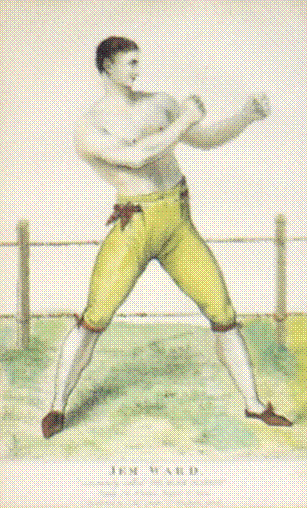
Jem Ward
Jem Ward was an English bare-knuckle boxer. "A fine fighter and powerfully built man", he was the English champion boxer from 1825 until 1831. However, he is most notable for being the first boxer to be officially disciplined for deliberately losing a fight. During his fighting career he was...
. The fight was originally scheduled to take place at Leicester on 10 March 1829, but at the last minute Ward claimed that he was unfit and too ill to fight, much to the disapproval of his backers and friends. Rumours circulated that Ward had refused to enter the ring unless he received a prize money of £250 plus an additional £250 if he lost; the event became known in some quarters as the Leicester Hoax. Ward did not fight again for two years, but he and Byrne finally met on 12 July 1831 at Willeycott, near Stratford upon Avon. Each fighter was paid £200. Although Ward was the older man he prevailed in the contest after one hour and seventeen minutes, when Byrne's seconds, Tom Spring
Tom Spring
Tom Spring was an English bare-knuckle fighter. He was heavyweight champion of England in 1821 until his retirement in 1824...
and Tom Reynolds, withdrew their man in the 33rd round.
An observer commented that Byrne may not have been in the best of condition for the fight, as "his appearance failed to favour the impression that he possessed active vigour"; boxing historian Gilbert Odd
Gilbert Odd
Gilbert Odd was a British boxing historian and sportswriter.Odd boxed briefly as an amateur, then at 18 turned his sights on the sports writing side of the game, becoming a ringside correspondent for the weekly magazine, Boxing. Starting in 1941 and continuing for ten years after, he served as...
describes the fight as "disgraceful". Another commentator noted that "it is a singular fact that neither of the men had a black eye; neither had an external cut worth mentioning".
Byrne versus Burke
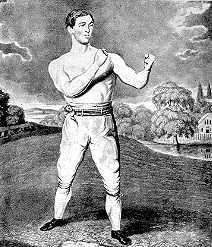
Bell's Life in London
Bell's Life in London, and Sporting Chronicle was a British weekly sporting paper published as a pink broadsheet between 1822 and 1886.Bell's Life was founded by Robert Bell, a London printer-publisher....
. He was succeeded as champion of England by James Burke
James Burke (boxer)
James "Deaf" Burke , 6 feet 2 inches tall, weighing 200 lb , was one of England's earliest boxing champions. He trained in the area around the River Thames....
, although some disputed Burke's right to the title as Ward had refused to fight him before retiring. Standing 6 feet 2 inches (1.88 m) tall, weighing 200 lb
Pound (mass)
The pound or pound-mass is a unit of mass used in the Imperial, United States customary and other systems of measurement...
(90 kg), and handicapped by deafness, Burke had assumed the championship after defeating Harry Macone in one of the prolonged and brutal fights for which he was known. Ward, who had faced public criticism for his refusal to fight Burke, felt that Byrne was the better fighter and promised to acknowledge the victor of a fight between Burke and Byrne as the new champion. The match took place on 30 May 1833 on Nomansland, a tract of common land
Common land
Common land is land owned collectively or by one person, but over which other people have certain traditional rights, such as to allow their livestock to graze upon it, to collect firewood, or to cut turf for fuel...
between the villages of Sandridge
Sandridge
Sandridge is a small village and civil parish between St Albans and Wheathampstead in Hertfordshire, England, United Kingdom.-Early history:...
and Wheathampstead
Wheathampstead
Wheathampstead is a village and civil parish in the City and District of St Albans, in Hertfordshire, England. It is north of St Albans and in the Hitchin and Harpenden parliamentary constituency....
in Hertfordshire
Hertfordshire
Hertfordshire is a ceremonial and non-metropolitan county in the East region of England. The county town is Hertford.The county is one of the Home Counties and lies inland, bordered by Greater London , Buckinghamshire , Bedfordshire , Cambridgeshire and...
, for a prize of £100 to each man. To get himself into condition for the fight Byrne had reduced his weight from 210 pounds (95.3 kg) to 186 pounds (84.4 kg), an effort that "as it was effected by hard work and sweating, somewhat impaired his natural stamina, especially as, his habits being far from abstemious when in Ireland, he was scarcely fitted to undergo the necessary amount of labour". Despite his hard work Byrne looked "fleshy", with "no special show of muscle", compared to Burke's "perfect condition", although he did have a slight height advantage. Burke weighed in at 172 pounds (78 kg), and started the contest as the marginal favourite at odds of 5–4.
Tom Spring was once again in Byrne's corner, as was Jem Ward. In true Burke style the match lasted for 3 hours and 6 minutes, during which time 99 rounds were fought, the longest ever recorded prize fight. For the most part Byrne seemed to be in control in the early stages of the fight; in the 30th round he trapped Burke against the ropes and battered him severely around the body before throwing him to the ground. Burke fell on his face, vomiting and throwing up blood, and for the next few rounds Byrne looked the more likely winner. By the 49th round however, Burke had recovered sufficiently to knock Byrne to the ground, whose hands by then were so swollen that he was unable to deliver a finishing blow. By the 93rd round Byrne was "scarcely able to stand, and rolled before the Deaf'un like a ship in a storm". Although both men were utterly exhausted Burke continued to "pepper away at [Byrne's] body and head", until in the 99th round Byrne collapsed unconscious and could not be revived to take his place once again at the scratch. A contemporary newspaper report of the day describes a blow-by-blow account of a fair match.
Byrne was carried to "The Woolpack" inn in nearby St Albans
St Albans
St Albans is a city in southern Hertfordshire, England, around north of central London, which forms the main urban area of the City and District of St Albans. It is a historic market town, and is now a sought-after dormitory town within the London commuter belt...
, where he was attended to by Tom Spring. On the evening of the fight Byrne was considered to be close to death, but over the course of the following two days he seemed to be recovering, and was sufficiently conscious to thank his friends for their ministrations. But his condition worsened during the afternoon of Saturday 1 June 1833, and he died the following day; the cause of death was given as "congestion of blood in the brain". Byrne himself was reportedly of a different opinion, telling a chambermaid shortly before his death that "If I should die, it will not be from the beating I received but from mortification. I would rather have died than been beaten in that fight." He left behind a wife and four children in Dublin.
Aftermath
One contemporary view of Byrne's fatal fight, and of his earlier contest against Ward, was expressed in a popular poem written by James Catnach, the catchpenny publisher of Seven DialsSeven Dials
Seven Dials is a small but well-known road junction in the West End of London in Covent Garden where seven streets converge. At the centre of the roughly-circular space is a pillar bearing six sundials, a result of the pillar being commissioned before a late stage alteration of the plans from an...
, London:
-
- On Thursday, May the 30th day, Brave Simon took the ring,
- Back'd by Jem Ward the champion, likewise by Gallant Spring,
- To fight Burke for two hundred pounds, a man of courage bold,
- To stop reports that with Ward the battle he had sold.
Burke was arrested and tried for manslaughter. He was acquitted on 11 July 1833, but avoided competitive fights for some time afterwards, only taking part in exhibition matches. He retired in 1843 and died of tuberculosis
Tuberculosis
Tuberculosis, MTB, or TB is a common, and in many cases lethal, infectious disease caused by various strains of mycobacteria, usually Mycobacterium tuberculosis. Tuberculosis usually attacks the lungs but can also affect other parts of the body...
less than two years later in 1845, having by then been reduced to poverty.
Following the death in 1838 of another fighter, William Phelps, also known as Brighton Bill, in a match against Owen Swift, the London Prize Ring Rules
London Prize Ring rules
The London Prize Ring Rules was a list of boxing rules promulgated in 1838 and revised in 1853. These rules were based on those drafted by Britain's Jack Broughton in 1743 and governed the conduct of prizefighting/bare-knuckle boxing for over 100 years...
were introduced by the Pugilists's Protective Association to more clearly define the range of fouls and to introduce certain safety measures. Butting, gouging, biting, scratching, kicking were all forbidden as was the use of stones or any hard object in the hand. Thirty-second breaks were introduced between rounds, at the end of which each fighter had to walk to the scratch unaided within 8 seconds. The wearing of spiked boots was prohibited, and boxers who went to ground without being hit were disqualified. These rules still form the basis for the modern sport of boxing.

